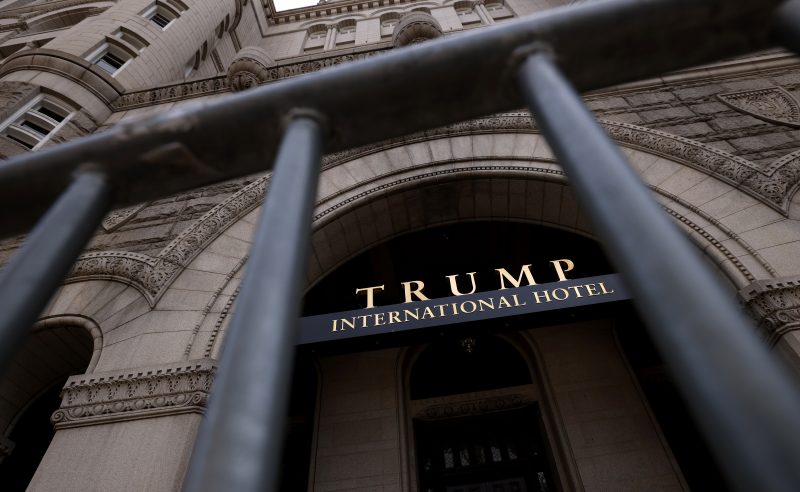
Trump hotel overcharged Secret Service, report by House Democrats finds
During Donald Trump’s presidency, his D.C. hotel charged the U.S. Secret Service 300 percent or more above standard government rates on multiple occasions, and at times charged the government agency more than it did other patrons — including a Chinese business and members of a foreign royal family, according to a new report released Friday by Democrats on the House Oversight Committee.
The authors of the report, which is based on Trump International Hotel room records from September 2017 and August 2018, argue that Trump violated the Constitution’s foreign and domestic emoluments clauses, which were designed to prevent the president and other federal officials from enriching themselves at taxpayer expense.
The House Democrats’ report cites several previously undisclosed instances in which Trump International Hotel charged the Secret Service rates that were not only above the normal government per diem rate but above rates it charged other patrons. The report is based on records Democrats obtained from Trump’s former accounting firm, Mazars USA, along with corresponding special waivers authorizing the Secret Service to make payments above normal government rates.
When Eric Trump visited the hotel on Feb. 22, 2018, two of the rooms the Secret Service rented were charged at $895 each, 450 percent more than the government rate, according to the report. The same evening, more than 100 rooms at the 263-room hotel were rented out at rates lower than $895, “including at least one room rented out for just $150,” the Democrats found.
That night, four rooms for a “Sheikh Al Thani Family Extended Stay” were charged at rates far less than what the Secret Service was charged, according to the report. The Al Thanis, who are a Qatari royal family, were charged $280 for three rooms and $490 for one room.
The Democratic report did not reveal the total number of rooms rented by the Secret Service, which is considered sensitive law enforcement information. Spokespeople for the Secret Service, the Trump campaign and the Trump Organization did not immediately respond to requests for comment.
During another visit by Eric Trump to the D.C. hotel at the end of the month, on Feb. 27, 2018, the agency paid for a $595 room, according to the report. That rate is far above the government-approved nightly rate for a hotel in D.C., which is usually $195 to $240, and varies from month to month based on average lodging rates in the city. That same evening, two rooms were charged to the Al Thani family at rates of less than $595.
The Washington Post has extensively reported on expenses the Secret Service incurred at Trump properties while agents were protecting him and his family during his time in the White House.
In 2022, The Post reported that U.S. taxpayers paid Trump’s business at least $1.4 million for Secret Service agents’ stays at Trump properties for his and his family’s protection. Receipts and invoices previously obtained by The Post have highlighted not just high charges for rooms at the luxury properties but additional fees, including a $1,300 “furniture removal charge” to the Secret Service in 2018 at Trump’s Turnberry resort in Scotland.
Eric Trump, the Trump Organization’s executive vice president, has repeatedly disputed claims that the family business profited from Secret Service stays at Trump properties and said that the company often gave the Secret Service agents the hotel rooms for free or at steeply discounted rates.
However, piecemeal expense records congressional investigators have obtained over the past four years have contradicted Eric Trump’s claims.
Before Republicans took control of Congress in early 2023, Mazars had begun producing documents in response to a congressional subpoena, turning over a subset of records to Oversight Committee Democrats, led by Rep. Jamie Raskin (Md.). But when Republicans assumed control of the House, the new Oversight Committee chairman, James Comer (R-Ky.), ended the congressional investigation into Trump’s alleged violations of the emoluments clause, declining to enforce a court-ordered agreement that Mazars produce evidence related to Trump’s business dealings.
Despite Republican control of the House, Democrats have sought to train public attention on the emoluments issue as Trump has sought to regain the presidency. The money that Trump and his family businesses took in from government sources while he was in the White House — despite his promises to “drain the swamp” — create “the appearance of corruption and pay-to-play,” Democrats argue in the report.
The latest findings are a follow-up of a staff report released by the Democratic staff on the Oversight Committee earlier this year that documented $7.8 million Trump received from at least 20 foreign governments, including China, Saudi Arabia and Qatar, through just four of his businesses over a two-year period while he was president. House Democrats’ new report is based on a single set of records provided to the committee for a single Trump property over an 11-month period, representing what Democrats estimate is only a fraction of the money his company brought in from the Secret Service over four years in office.
The report homes in on room charges footed by the Secret Service, “which Donald Trump treated as his own personal government ATM, extracting from it exorbitant rates his hotel imposed while Secret Service agents protected him, his children, and even foreign leaders,” the Democratic investigators allege.
In one such instance, during a Nov. 28, 2017, stay by Eric Trump and his wife Lara Trump, room records show the Secret Service rented several rooms at a $600 rate — 300 percent more than the $201 normal government rate that month — while a dozen rooms rented to a Chinese company, Inner Mongolia Yitai Coal Co., Ltd., rented for $338.85 each. According to the report, the records also show that more than 80 rooms were rented out that evening at rates less than $600 per room.
Earlier that month, on Nov. 8, 2017, two of the rooms rented by Secret Service to accommodate a visit by Donald Trump Jr. were charged at the rate of $1,185 — five times the per diem rate of $201. That same evening, however, more than 100 rooms were rented out at $125 each. An additional 100 rooms were charged to the “LOC Software R2CON” conference for $170 each, committee investigators found.
Investigators also identified 16 examples of individuals who “made some or all of their expenditures at the hotel while they were federal or state officials,” including eight ambassadors, three individuals appointed by Trump to be federal judges, two governors, one delegation from a state legislature, and two executive branch officials. The payments from the 16 individuals totaled $163,095.23 over that period.
The records produced by Mazars to the committee do not specify the sources of payment for the rooms, but investigators argue that any payments federal or state officials made to Trump’s businesses using state or federal taxpayer funds would represent violations of the domestic emoluments clause.
House Republicans dismissed the report as misleading and outdated, criticizing Democrats for what they characterized as their lack of oversight of the Biden administration.
“Ranking Member Raskin and Democrats continue to expose their hypocrisy as they suffer from Trump Derangement Syndrome,” Comer said in a statement. “Today’s report is more recycled garbage from the Democrats’ fruitless and close to a decade-long investigation of President Trump.”
The Trump Organization sold the D.C. hotel to a Miami-based investment fund in 2022. Trump’s remaining portfolio of hotels and golf courses could continue to attract controversy over spending by foreign governments and corporate entities during a second Trump presidency. But some of his new, post presidency business ventures — such as his cryptocurrency enterprise — may give rise to new and unprecedented conflicts of interest for Trump in a second term.
“While we still do not know the full extent of the unconstitutional payments Trump pocketed while fleecing American taxpayers, one thing is certain: we must put legal barriers in place now to prevent the kind of rip-off corruption our Founding Fathers so strongly opposed,” Raskin said in a statement.
